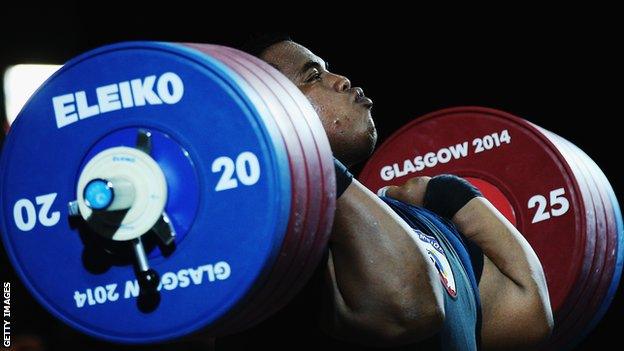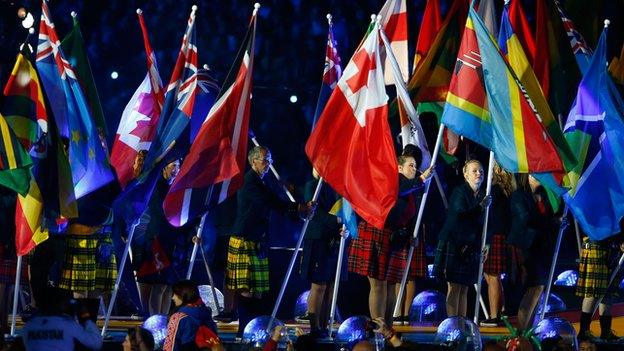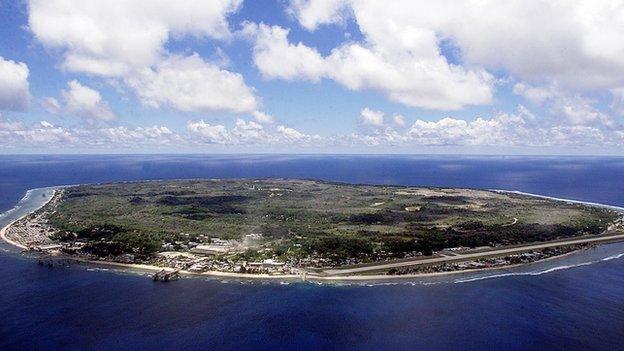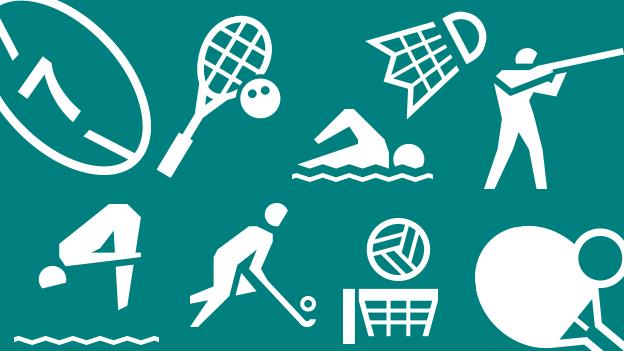Glasgow 2014: Who wins our population-adjusted medal table?
- Published

Who is this strong man, and where does he come from?
Before the first medal was contested at Glasgow 2014, BBC Sport took an in-depth look at the previous six editions of the Commonwealth Games to find out which country had been most successful.
Unsurprisingly, the traditional sporting powerhouses of Australia, South Africa, New Zealand and Canada joined England and, to a certain extent, the other home nations in the upper echelons of the medals table.
But hang on, we thought, isn't this all a bit unfair on the smaller nations? How on earth, for example, is it realistic to compare a tiny Caribbean island with India, for example, when the latter has more than a billion people from which they can select their teams?
So we did a lot of number crunching and produced a population-adjusted medals table.
We should point out that while traditional medals tables rank each country first by the number of gold medals, then silvers and then finally bronzes, we decided to factor in their relative worth by awarding three, two and one points respectively.
This produces something we are calling "medal points".
Our alternative league table is calculated by dividing each nation's population (an average worked out by examining the population in each Commonwealth Games year between 1990 and 2010) by medal points.
Per capita, who is most successful in the Commonwealth Games from 1990-2010? | ||||
|---|---|---|---|---|
Rank | Nation/territory | Average Population (1990-2010) | Average Medal Points | People per Medal Point |
1 | Nauru | 9,833 | 9.17 | 1,073 |
2 | (Western) Samoa | 174,721 | 3.83 | 45,579 |
3 | Australia | 19,335,367 | 402.83 | 47,998 |
4 | Bahamas | 304,541 | 6.00 | 50,757 |
5 | Seychelles | 80,140 | 1.50 | 53,427 |
6 | New Zealand | 3,877,617 | 72.33 | 53,608 |
Nauru - a tiny and remote Pacific island which has a population of less than 10,000 - was the surprise winner.
A large portion of the credit for that must go to Marcus Stephen, who claimed seven golds and five silvers in four Commonwealth Games between 1990 and 2002.
Commonwealth Games 2014: Watch Marcus Stephen's 1990 winning lift
The weightlifter, who despite standing only 5ft 3in (160cm) tall and tipping the scales at less than 9st 10lb (62kg) during his competition days, managed to lift 172kg - nearly three times his own weight and only 3kg off the then world record.
A more detailed population-adjusted league table reveals that the hugely populous South Asian giants of Sri Lanka, India, Pakistan and Bangladesh did pretty poorly, ranked 38th, 39th, 42nd and 43rd respectively, while Kenya (27th), South Africa (28th), and Nigeria (34th) also struggled.
When it came to the nations and territories of the British Isles, the results were equally interesting.
England fans no longer had the bragging rights - their country instantly went from top of the pile to bottom of the heap.
How about the nations and territories of the British Isles? | ||||
|---|---|---|---|---|
Rank | Nation/territory | Average Population (1990-2010) | Average Medal Points | People per Medal Point |
7 | Isle of Man | 76,714 | 1.33 | 57,536 |
9 | Wales | 2,922,483 | 38.33 | 76,239 |
11 | Guernsey | 62,258 | 0.67 | 93,387 |
13 | Scotland | 5,109,067 | 42.67 | 119,744 |
14 | Northern Ireland | 1,693,350 | 13.33 | 127,001 |
15 | Jersey | 89,459 | 0.67 | 134,188 |
17 | England | 49,565,917 | 262.17 | 189,063 |
So that was how things have traditionally been - but is the picture any different at the Games which ended on Sunday?
This is how the top of the Glasgow 2014 medals table looks - and it is dominated by the usual sporting giants:
Who was most successful at Glasgow 2014? | |||||
|---|---|---|---|---|---|
Rank | Nation/territory | Gold | Silver | Bronze | Medal Points |
1 | England | 58 | 59 | 57 | 349 |
2 | Australia | 49 | 42 | 46 | 277 |
3 | Canada | 32 | 16 | 34 | 162 |
4 | India | 15 | 30 | 19 | 124 |
5 | Scotland | 19 | 15 | 19 | 106 |
What about the other teams from around the British Isles?
Rank | Nation/territory | Gold | Silver | Bronze | Medal Points |
|---|---|---|---|---|---|
9 | Wales | 5 | 11 | 20 | 57 |
14 | Northern Ireland | 2 | 3 | 7 | 19 |
29 | Isle of Man | 0 | 1 | 0 | 2 |
38= | Guernsey | 0 | 0 | 0 | 0 |
38= | Jersey | 0 | 0 | 0 | 0 |
That's all well and good, but what happens once populations are again taken into account?
Per capita, which is Glasgow 2014's most successful nation or territory? | ||||
|---|---|---|---|---|
Rank | Nation/territory | Population (2014) | Medal Points | People per Medal Point |
1 | Nauru | 9,488 | 2 | 4,744 |
2 | Grenada | 110,000 | 4 | 27,500 |
3 | Kiribati | 104,000 | 3 | 34,667 |
4 | Samoa | 197,000 | 5 | 39,400 |
5 | Isle of Man | 87,000 | 2 | 43,500 |
So although there are honourable mentions for Grenada (who won a gold and a bronze thanks to Kirani James in the men's 400m and decathlete Kurt Felix), external and Pacific island nation Kiribati (giant weightlifter David Katoatau won gold before memorably busting some moves as if he was on the dancefloor) we're left with a familiar name as the winner of BBC Sport's alternative medals table - Nauru.
The island - which only takes 20 minutes to drive around and has been covered with thousands of years' worth of bird droppings - only had a 10-strong team but continued their fine weightlifting tradition in Glasgow.
Itte Detenamo took silver in the men's +105kg division, external to maintain Nauru's record of having won at least one medal at each of the seven Commonwealth Games they have entered since making their bow back in 1990.
And, being the world's smallest republic, they are likely to be top of the tree in future Commonwealth Games and Olympics.
Let's take a look at how the British Isles' biggest four Commonwealth Games teams fared in Glasgow, along with some selected others.
Rank | Nation/territory | Population (2014) | Medal Points | People per Medal Point |
|---|---|---|---|---|
6 | Scotland | 5.2m | 106 | 49,057 |
7 | New Zealand | 4.4m | 87 | 50,575 |
8 | Wales | 3m | 57 | 52,632 |
12 | Australia | 22.5m | 277 | 81,227 |
13 | Northern Ireland | 1.8m | 19 | 94,737 |
16 | England | 54m | 349 | 154,728 |
18 | Canada | 34.8m | 162 | 214,815 |
22 | South Africa | 48.4m | 76 | 636,842 |
33 | India | 1.2bn | 124 | 9,677,419 |
36 | Pakistan | 196.2m | 7 | 28,028,571 |
Some cheer, then, for hosts Scotland, who won the battle of the Celtic nations between them, Wales and Northern Ireland.
Despite handsomely winning the conventional medals table, our research suggests England has actually punched below its weight, and that, relatively speaking, the Scots have been three times as successful.
With the 2016 Rio Olympics in mind (notwithstanding any constitutional implications of next month's Scottish independence referendum) the UK will again come together as Team GB.
The UK population currently stands at 64.1 million - a year-on-year increase of around 400,000.
For want of argument, let's assume it increases by a similar number in each of the next two years, making a rough total of 65 million in 2016 compared with Nauru's 10,000.
In Rio, Team GB would therefore have to win (an utterly impossible, of course) 2,167 golds to trump a single Nauruan bronze medal in order to finish higher than them in our population-weighted table.
- Published3 August 2014

- Published22 July 2014

- Attribution
- Published17 July 2014
